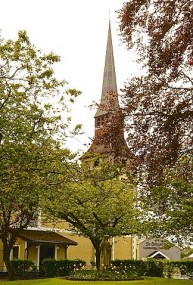Fifth Sunday of Easter
A Reflection for The Fifth Sunday of Easter
JN: 14: 1-12
Do not let your hearts be troubled
 Many years ago when I was a young man preparing for the Leaving Certificate, the Shakespearean play that year was Hamlet. In the play there is a line “By indirections find directions out.” I always liked the idea of a wrong direction as a means to discover a right way.
Many years ago when I was a young man preparing for the Leaving Certificate, the Shakespearean play that year was Hamlet. In the play there is a line “By indirections find directions out.” I always liked the idea of a wrong direction as a means to discover a right way.
The context for this Gospel reading is the Last Supper. Life had changed rapidly for Jesus and his followers. From a vast public ministry lived in the public eye, the moment had arrived for a small gathering of friends to share a last meal together. At this meal Jesus said to his apostles, “Do not let your hearts be troubled”. There would have been no need to say the words if the hearts of the apostles were calm and collected. Outside the upper room evil forces were at work and a terrible fate would befall Jesus.
It is easy to imagine the fear that was eating at the apostles and leading them in a wrong direction, a path of despair and hopelessness. The future must have seemed a bleak and terrifying place. The words that Jesus spoke responded to the immediate concerns, fears and anxieties of the apostles.
Jesus was living in the present and his words, “Do not let your hearts be troubled” pointed them in a right way. In the midst of turmoil Jesus has a steady eye on an uncertain future. He shows a path of calm and peace to those He loves. There will be hurt and suffering and death but that will not be the end of the story. There is more, so much more to look forward to in this life and in the next. That is the message of the empty tomb.
So today Jesus says to us all “Do not let your hearts be troubled”. These are words of hope and consolation. These are words of love, of gentleness and compassion.
Paddy Moran C.S.Sp. – Fr. Paddy is a current member of the Provincial Leadership Team and is a chaplain in 2 Spiritan schools in Dublin. He spent many years on mission in Ethiopia where prison ministry was a key part of his work.
